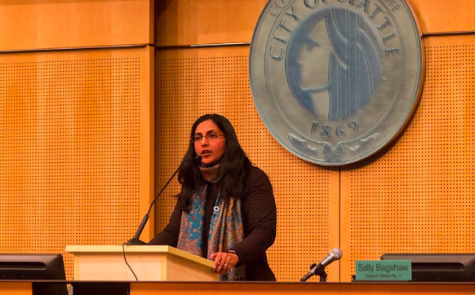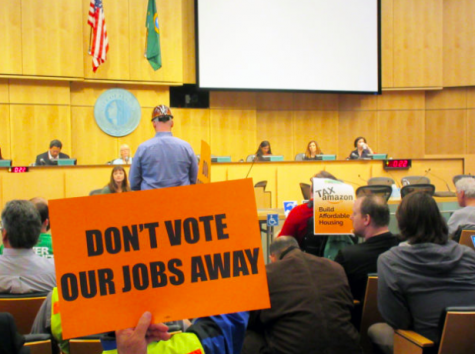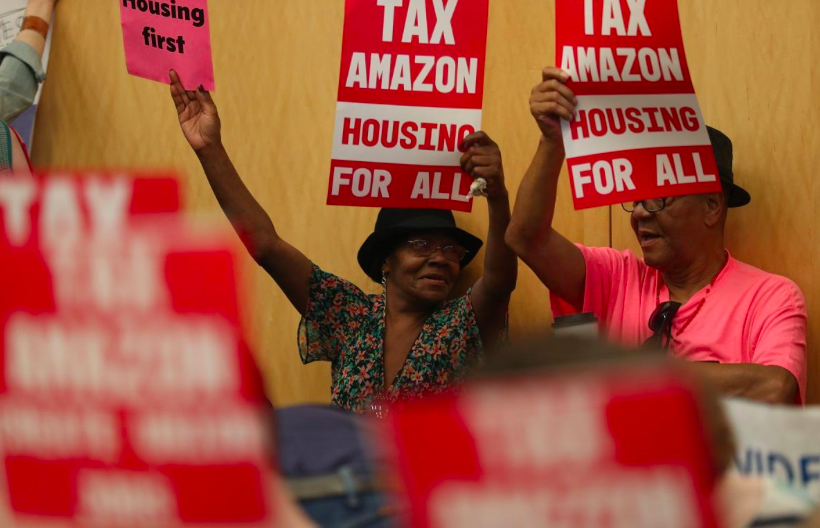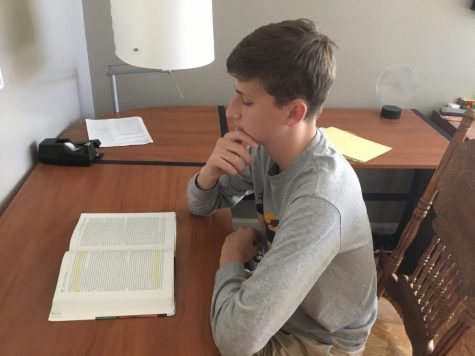Seattle City Council’s New Head Tax Stirs Up Controversy
May 17, 2018
In reaction to Seattle’s increasing homelessness problem, the Seattle City Council has passed a “head tax” on large businesses in the Seattle area. Corporations such as Amazon, Boeing, and Starbucks will take a big hit, with companies facing an annual tax of $275 per full-time employee.
Any company with a gross revenue above $20 million will be forced to comply, causing major Seattle-based companies to debate about staying in Seattle.
Seattle City Council first proposed an annual head tax of $500 per full-time employee, which Amazon and other business vehemently opposed. Amazon halted the huge construction project in the heart of downtown Seattle upon news of the upcoming vote on the measure. Employees of the corporations and members of the construction crew fear unstable job security or relocation if the tax remains. Construction workers on the project protested the tax by attending an event hosted by Seattle City Councilmember and supporter of the tax, Kshama Sawant. Each time Sawant went to speak about the tax, the construction workers would chant “No head tax!”.

Seattle-based companies have let the city council know that they are strongly against the head tax. According to CNN Money, 131 company leaders have signed a letter that stated their objections with the tax. Large and small companies alike have shown their disapproval, including Amazon, Starbucks, Alaska Airlines, and many more. One of their main concerns is that it hinders companies’ ability to grow and create jobs.
On the other hand, 10 labor groups sent a letter to the council supporting the proposal. The unions believe that since Seattle has such a regressive tax system, it is necessary to ensure that the large corporations are contributing to the taxation. Amazon did not pay any federal tax in 2017, which has upset many Seattleites. They are expected to claim a $790 million payday as a result of the recent federal tax cut.
According to the American Prospect, “between 2015 and 2017, the rate of homelessness in the city grew by 44 percent.” However many question if this bill will really help the homelessness problem that has been looming over Seattle. The bill may lead to company relocation and in turn, higher rates of homelessness, perpetuating the issue of homelessness in the city.
The tax has been projected to take in $41 million annually and spend approximately 66% on affordable housing; 32% on emergency shelter, trash pickup, raises for service workers, and other programs; and 2% on administration. Over the next five years, the council projects that 591 units of low-incoming housing could be built as a result of the tax. In order to keep the public informed on how the collected money will be spent, an oversight committee has been created to maintain transparency between the Seattle City Council and Seattle citizens. Seattle will invest over $100 million in affordable housing this year, and over $63 million in other homeless programs.
The Seattle City Council may feel the wrath of the people for this policy stance in the upcoming election next year. Some think that the citizens should draft their own proposal to preserve Seattle’s economic prosperity in the future. This would only require 21,770 signatures to get on the ballot. The citizen bill floating around would directly address the fiscal inefficiency in Seattle’s current homeless spending, which is quickly approaching $70 million for this year. A 2016 study reported by the Seattle Times found that the recent homelessness downfalls have been caused more by mismanagement and flawed contracts by City Council, rather than lack of funding.

Chicago is one city who experimented with a $48-per-head tax. Current mayor, Rahm Emanuel worked with Chicago’s council to eliminate it, as it subsequently drove business out of the city and led to more problems with homelessness.
Bishop Blanchet Librarian Jody Purcell thinks the head tax is a great idea and will help the serious homelessness problem in Seattle.
“I think it’s a good idea because homelessness is a serious problem in Seattle that has not been resolved yet,” said Purcell. “The people who will be paying for this, for example, Amazon, also made the problem worse because they’re the ones who ripped out the homeless shelters and the low-income housing that those people used to have that are now making the homeless problem worse. So it’s totally an appropriate tax.”
Bishop Blanchet Choir Director Rebecca Cantrell, thinks the idea is good, but is worried about the repercussions.
“I think the idea is good, but it will have a lot of unintended consequences especially for small businesses,” said Cantrell.
With the bill being passed, the future of business and employment in Seattle is up in the air.










